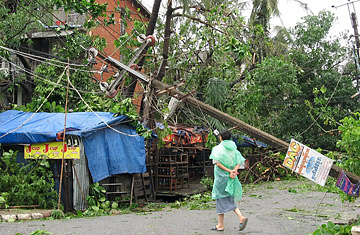
Damage from cyclone Nargis in the Irrawaddy delta region.
Burma's state media quoted a government official saying the situation in the country was "returning to normal." This as the death toll from last week's cyclone is estimated, by some, to be as high as 100,000, as bodies float in waterways, as shortages of water, rice, medicine and fuel, as well as fear of disease, grip the populace and people swarm shops and and dash toward any location where they think they can find supplies to help them make it through the crisis.
It's never been easy to divine what Burma's military rulers consider "normal." Last September, the government sent out hundreds of thousands of soldiers to throttle pro-democracy demonstrations initiated by the country's Buddhist monks. But amid this week's devastation, relatively few of those soldiers have shown up to offer assistance. Meanwhile, the monks have reportedly been warned not to open their monasteries to the homeless for sanctuary. Government bureaucrats, meanwhile, are said to be charging a fee for building materials they are in charge of "distributing."
Burma has been selective about accepting foreign aid. It has allowed help in from allies like India and China and from neighboring Thailand to enter. After some hesitation over a number of days, the junta okayed a large shipment from the United Nations. It has yet to arrive. Aid workers from numerous organizations and personnel from numerous nations are mobilized and ready to assist, but the regime has been slow to process visas, fearing infiltration by journalists, who are banned, and more generally, Western, pro-democratic influence, which is not to be trusted. "They want the foreign aid but not the foreign aid workers," says Maureen Aung Thwin, Director of the Open Society's Burma Project.
And that fear of infiltration is key to understanding the normalcy pursued by Burma's generals. Even as the Burmese people struggle to survive in the wake of the storm, the government is insisting on going ahead with a referendum on a draft constitution the leaders claim would open the door for democratic elections in 2010, but which most view as a rigged effort to prop up support for their rule. The deaths of tens of thousands of people, in other words, should not impede efforts to codify the primacy of the generals. At a time when Burma's rice growing regions — which once made it the world's top rice producer — have been devastated leaving its people starving for the staple, the junta seems determined to remain the world's number one producer and consumer of barbed wire — literally and figuratively. The people are cowed. They utilize hushed tones when speaking to foreigners, take furtive glances over their shoulders, all part of the fearful obedience that keeps them calibrated to the crackdown they know to expect if they step out of line.
Nevertheless, the government seems to know that a natural disaster on this scale could trigger revolutionary change. Aung Thwin says this could be "a make or break time," and that there have been signs that the regime realizes it will be held accountable for what happens next. At the same time, though, she says they're trying to stage manage the entire process, skirting the fact that even if they do have the will to do what needs to be done, they have neither the capabilities nor the resources to pull it off. For at the heart of the junta's fearsome "normality" is fear itself.
